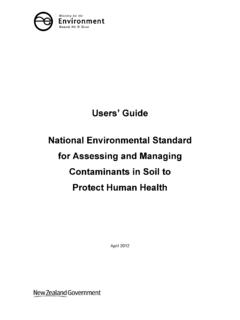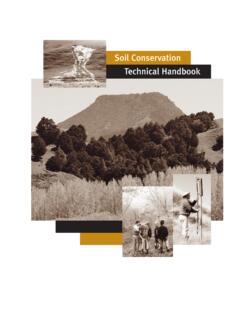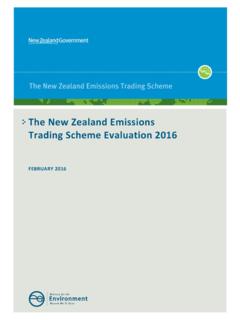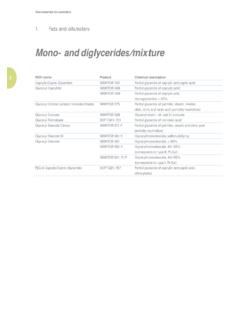Transcription of for Freshwater Management 2014
1 NATIONAL POLICY STATEMENTfor Freshwater Management 2014 Updated August 2017 to incorporate amendments from the National Policy Statement for Freshwater Amendment Order 20172 ContentsPreamble 4 Review 6 Title 7 Commencement 7 National significance of fresh water and Te Mana o te Wai 7 Interpretation
2 8AA. Te Mana o te Wai 11 Objective AA1 11B. Water quality 12 Objective A1 12 Objective A2 12 Objective A3
3 12 Objective A4 12B. Water quantity 15 Objective B1 15 Objective B2 15 Objective B3
4 15 Objective B4 15 Objective B5 15C. Integrated Management 17 Objective C1 17CA.
5 National Objectives Framework 18 Objective CA1 18CB. Monitoring Plans 21 Objective CB1 21CC. Accounting for Freshwater takes and contaminants 23 Objective CC1 23D. Tangata whenua roles and interests 24 Objective D1 24E. Progressive implementation programme 25 Appendix 1: National values and uses for fresh water 26 Appendix 2: Attribute tables 303 Appendix 3: Existing infrastructure for the purposes of Policy CA3(b) 42 Appendix 4.
6 Freshwater Management units and periods of time for transition for the purposes of Policy CA4 43 Appendix 5: Surveillance monitoring of E. coli at primary contact sites 44 Appendix 6: National target for water quality improvement 45 Reprint notes 47 4 Preamble Fresh water is essential to New Zealand s economic, environmental, cultural and social well-being.
7 Fresh water gives our primary production, tourism, and energy generation sectors their competitive advantage in the global economy. Fresh water is highly valued for its recreational aspects and it underpins important parts of New Zealand s biodiversity and natural heritage. Fresh water has deep cultural meaning to all New Zealanders. Many of New Zealand s lakes, rivers and wetlands are iconic and well known globally for their natural beauty and intrinsic values. The Treaty of Waitangi/Te Tiriti o Waitangi is the underlying foundation of the Crown iwi/hap relationship with regard to Freshwater resources.
8 Addressing tangata whenua values and interests across all of the well-beings, and including the involvement of iwi and hap in the overall Management of fresh water, are key to giving effect to the Treaty of Waitangi. All New Zealanders have a common interest in ensuring the country s Freshwater lakes, rivers, aquifers and wetlands are managed wisely. New Zealand faces challenges in managing our fresh water to provide for all of the values that are important to New Zealanders. The quality, health, availability and economic value of our fresh waters are under threat.
9 These challenges are likely to increase over time due to the impacts of climate change. To respond effectively to these challenges and issues, we need to have a good understanding of our Freshwater resources, the threats to them, and provide a Management framework that enables water to contribute both to New Zealand s economic growth and environmental integrity and provides for the values that are important to New Zealanders. Given the vital importance of Freshwater resources to New Zealand and New Zealanders, and in order to achieve the purpose of the Resource Management Act 1991 (the Act), there is a particular need for clear central government policy to set a national direction, though the Management of the resource needs to reflect the catchment-level variation and different demands on the resource across regions.
10 This includes managing land use and development activities that affect fresh water so that growth is achieved with a lower environmental national policy statement recognises Te Mana o te Wai and sets out objectives and policies that direct local government to manage water in an integrated and sustainable way, while providing for economic growth within set water quantity and quality limits. The national policy statement is a first step to improve Freshwater Management at a national demand for fresh water increases, it is vital to account for all Freshwater takes and sources of relevant contaminants.















